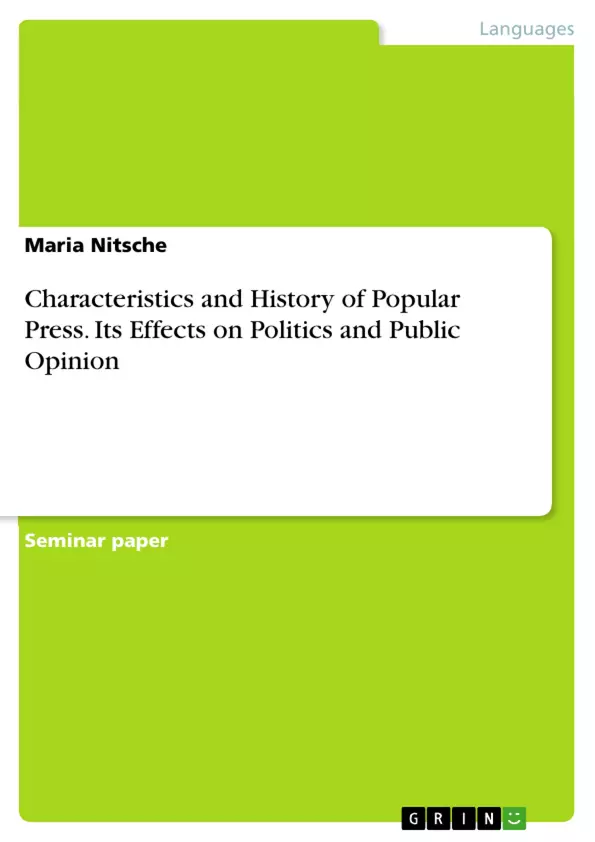Despite the fact that the influence of TV and radio rose in recent years the press is still one of the most important media for information. In Britain more than 16 million national newspapers are sold every day (disregarding regional as well as international papers). Thus the press reaches at least 40 million people and plays an important role in forming public and political opinion. Because of its considerable influence in public affairs it is considered to be an instrument for controlling the government. That is why the press is often called the "4th Estate". In Britain the press can be divided into different groups: Dailies and Sundays, Regionals and Nationals, Qualities and Populars. The difference between the quality and popular newspapers is basically obvious in style and conte nts. I will focus on the national, daily Populars in the following.
Table of Contents
- Introduction
- Characteristics
- Early History
- Restrictions
- Code of Practice
- Press Complaints Commission
- Official Secrets Act
- Facts
- Circulation Figures
- Individual Papers
- Newspaper Ownership
- Effects
- On Politics
- On Public Opinion
Objectives and Key Themes
This text aims to provide an overview of the British popular press, its characteristics, history, and influence on society. The main focus is on national, daily popular newspapers, also known as tabloids.
- Characteristics and development of the popular press
- Historical evolution of the popular press in Britain
- Regulation and restrictions on the press in Britain
- Circulation figures and ownership of popular newspapers
- The impact of the popular press on politics and public opinion
Chapter Summaries
- Introduction: This chapter introduces the topic and highlights the importance of the press in British society, particularly in shaping public and political opinion.
- Characteristics: This chapter examines the characteristics of the popular press, such as its tabloid format, layout, language, and content. It also explores the phenomenon of "tabloidisation".
- Early History: This chapter traces the early history of the popular press in Britain, starting with the founding of the Daily Mail in 1896. It discusses the role of Alfred Harmsworth and the impact of the 1870 Education Act on the growth of readership.
- Restrictions: This chapter delves into the regulations and restrictions placed on the British press, particularly through the Code of Practice, the Press Complaints Commission, and the Official Secrets Act.
- Facts: This chapter presents statistical information on circulation figures, political tendencies, and ownership of popular newspapers in Britain.
Keywords
This text focuses on the key topics of the popular press, tabloid journalism, newspaper regulation, circulation figures, political influence, and public opinion in Britain. The text also discusses the concepts of tabloidisation, the "knowledge gap", and the "4th Estate".
Frequently Asked Questions
What is the "4th Estate"?
The press is often called the "4th Estate" because of its significant influence in public affairs and its role as an instrument for controlling the government.
What distinguishes "Populars" from "Qualities" in the British press?
Popular newspapers (tabloids) focus on human interest stories, simpler language, and a larger layout with more photos, whereas qualities focus on in-depth political and economic news.
What was the impact of the 1870 Education Act?
The Act increased literacy rates in Britain, creating a massive new market of readers that led to the rise of popular newspapers like the Daily Mail.
How is the British press regulated?
The press is subject to a Code of Practice and oversight by the Press Complaints Commission (PCC), as well as legal restrictions like the Official Secrets Act.
What does "tabloidisation" mean?
It refers to a trend where news content becomes more sensationalist, focusing on celebrities and entertainment rather than serious public issues.
- Quote paper
- Maria Nitsche (Author), 2002, Characteristics and History of Popular Press. Its Effects on Politics and Public Opinion, Munich, GRIN Verlag, https://www.hausarbeiten.de/document/33598


